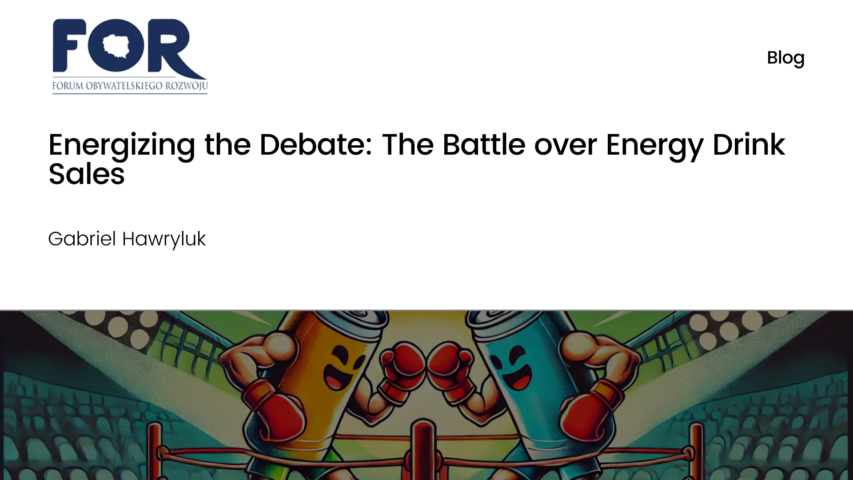Energizing The Debate: The Battle Over Energy Drink Sales

Energizing The Debate: The Battle Over Energy Drink Sales
Gabriel Hawryluk // 13 October 2023
Recent legislation in Poland restricting the sale of energy drinks has sparked a debate over the extent of state intervention. The move, ostensibly driven by concerns regarding the well-being of minors, raises questions about personal accountability and the effectiveness of such measures.
The ayes have it
The Polish parliament has passed legislation prohibiting the sale of energy drinks to individuals below the age of 18. This comprehensive legislative change extends beyond age limitations, including bans on selling these drinks in educational institutions and through vending machines. These new restrictions are scheduled to come into effect from 1 January 2024.
Defining energy drinks
The law defines energy drinks as beverages containing caffeine levels exceeding 150 mg/l or infused with additional taurine. Typically, these drinks contain approximately 300–320 mg/l of caffeine, which is roughly equivalent to 80 mg per standard 250 ml can. During the legislative process, government-provided statistics suggest that a child’s daily caffeine intake should not surpass 2.5 mg per kg of their body weight. As a result, a child weighing 40 kg would safely be able to consume up to 100 mg of caffeine per day. The same data, however, reveals that an average child’s daily caffeine intake from energy drinks slightly surpasses 3 mg. Among those who consume these energy drinks regularly, the figure rises to just under 43 mg.
The government also cites the recommendation of the European Food Safety Authority, which prescribes that individuals under the age of 16 should refrain from consuming energy drinks. However, proponents of this law find this justification to be sufficient to warrant a ban applicable to all minors. Nonetheless, this decision raises concerns regarding the lack of substantial rationale for setting the age threshold so high, especially because age verification can be easily facilitated through school ID cards, which are mandatory in Poland, whether in physical or electronic form.
Controversies and missteps
The legislation also gives rise to several other controversies. The ban on the sale of energy drinks involves all educational institutions, including those exclusively attended by adults. Consequently, teacher training centres limited to adult participants will also be prevented from selling energy drinks. Surprisingly, this prohibition would even extend to situations and premises where adults have no contact with children whatsoever.
Accessibility of caffeine to minors
It is important to emphasise that the legislation solely restricts beverages with non-naturally occurring caffeine concentrations. As a result, coffee- and tea-based drinks remain unaffected. Coffee, with its potentially higher caffeine content, serves as a prime example of this exemption. Instant coffee, for instance, can contain 380–730 mg of caffeine per litre, exceeding the caffeine levels in energy drinks. Comparable caffeine levels can be found in instant black tea or dark chocolate; for instance, 330 ml of strong tea or a 100 g dark chocolate bar can provide the body with as much caffeine as a 250 ml energy drink.
Minors will still be able to buy sweetened beverages with lower caffeine concentrations. Typical cola drinks, for instance, contain about 100 mg of caffeine per litre. This means that a 0.85 litre bottle of cola could contain more caffeine than a standard 250 ml energy drink. Yet, the new law specifically targets one product type, leaving access to caffeine largely unregulated for children.
Ineffectiveness and state paternalism
History highlights the ineffectiveness of state regulations, evident in the widespread consumption of alcohol among the youth. Despite extensive restrictions, the 2019 European School Survey Project on Alcohol and Drugs report reveals that almost half of the 15–16-year-old population had consumed alcohol in the previous month, with over 80 per cent experimenting with it at least once. These statistics highlight the impact of societal norms and education on official restrictions.
In contrast, several EU member states (Austria, Belgium, Cyprus, Denmark, Germany, Malta, and Luxembourg) permit 16 – and 17-year-olds to purchase certain alcoholic beverages while simultaneously conducting programmes educating them about safe alcohol use. These countries acknowledge that gradual exposure fosters responsible consumption. Conversely, adolescents of the same age in Poland will now be unable to legally buy energy drinks.
Poland’s ranking on the Nanny State Index is telling, currently positioned 9th among 30 European countries. The state’s regulatory paternalism primarily aligns with Eastern European states and a few nations from the West. In contrast, many Western countries entrust their citizens with greater autonomy in decision-making.
Conclusion
The ban on selling energy drinks to minors appears to lack comprehensive support. Adolescents will continue to access caffeine through alternative means, raising doubts about the law’s exclusive focus on a single product. This move has raised suspicions of pre-election posturing, exploiting the guise of child protection for political gain.
A policy of sweeping prohibition, rather than comprehensive education, might fail to achieve the desired outcome and instead be viewed as an example of state overreach. Responsible energy drink consumption by teenagers does not inherently pose significant risks, and the government’s data fails to convincingly demonstrate the widespread abuse of caffeine and energy drinks.
EPICENTER publications and contributions from our member think tanks are designed to promote the discussion of economic issues and the role of markets in solving economic and social problems. As with all EPICENTER publications, the views expressed here are those of the author and not EPICENTER or its member think tanks (which have no corporate view).



